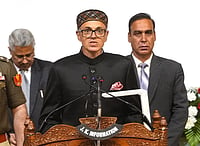Jaya Jaitly made a sterling contribution to the world of crafts, whether it was giving the Gujarat State Emporium a total makeover, creating Dilli Haat—both now sadly fallen on bad times—or des-igning the fabulous crafts maps of India. But her political career, powered largely by her special friendship with socialist leader George Fernandes, a heroic figure in his time, was nowhere as significant. Jaya Jaitly stood out certainly: a striking figure in her gorgeous handloom saris, big bindis and trendy jholas, she came through as confident and articulate. But it was her proximity to Fernandes that pla-ced her centrestage.
Maverick In Pretty Handloom
Her claim to a major role in socialist politics and self-defence in the Tehelka sting affair fills up Jaya Jaitly’s memoir. Much of it stretches credulity too.

So it is a bit surprising that in her autobiography Life Among the Scor-pions: Memoirs of a Woman in Indian Politics, Jaitly not only projects herself as playing a key role in socialist politics, but also as a woman denied success by scheming male politicians. Those who watched her during those years know that her failure to reach the heights she believed she was capable of had as much to do with her being a woman as her party’s perception that she was something of a dilettante. She was, in the parlance of the Hindi-belt politician, not just ‘non-political’ (she admits Fernandes rarely took her advice), but that she also constantly courted controversy as that kept her in the limelight.
Of course, Fernandes trusted her imp-licitly and depended on her to get his way in the party, but the relationship was—as she herself acknowledges—that of mentor and follower. Beyond the warm personal relationship they clearly shared—on which she sheds little light—he also sought to nurture her career. Far too much of the book is devoted to Jaitly’s defence of herself in the Tehelka sting operation: the spy tapes had showed her being offered Rs 2 lakh for her party from a fictitious company, West End International, apparently to enhance the firm’s chances of getting shortlisted for the trial of binoculars.
Whatever the truth, it was clearly imp-roper for Jaitly to entertain representatives of an arms company in the defence minister’s drawing room. Yet, at the time, if she resisted stepping down for three days, she still feels she was unfairly made to quit as Samata Party president. The delay in her resignation compelled PM Atal Behari Vajpayee to ask for Fernandes’s resignation.
The most readable section deals with her childhood years in which she lovingly details the minutae of growing up in an aristocratic Nair household in Kerala—from the clothes they wore, the food they ate and how sexually liberated the women in a matrilineal family were, to the intricacies of the caste system. The fact that her father, K.K. Chettur, was a diplomat in the 1950s meant a childhood lived partly in Lutyens Delhi and more so in Japan, Belgium, Myanmar and an expensive school in England. Her father’s premature death saw her return with her mother to Delhi, where they first lived with relatives bef-ore moving to Kota House, the Naval Mess on Shah Jehan Road, and then to Sujan Singh Park. Her mother became social secretary to the then US ambassador: this connection helped her move from Miranda House in Delhi to the exclusive Smith College in the US. She then married her college sweetheart, Ashok Jaitly, who was to
become a distinguished civil servant, and whom she eventually divorced for a life with Fernandes and politics. Jaitly is also a woman of strong likes and dislikes: she dismisses Sonia Gandhi as an au pair who did not have the intellectual capability of university going girls, and praises Narendra Modi, absolving him of all blame in the handling of the 2002 Gujarat riots.
Given the richness of the life Jaitly has led, her memoirs could have made for a fascinating—and credible—book, but the strong streak of self-righteousness? mars it. She takes for granted the access and privilege she was born into, the upper--class connections that made her life easy, and yet repeatedly talks of poverty—of the ‘tiny’ apartments or modest flats she lived in after her father’s death. She says that in 2001, when her daughter Aditi got married (to cricketer Ajay Jadeja) in Delhi’s Kashmir House, and for which cooks were brought in from Srinagar, the cost of feeding well over a thousand guests—the guests’ cars, she says, stre-tched for three kilometres—was Rs 1.5 lakh, which would work out to less than Rs 150 a plate. Unbelievable? Just like many other parts of the book.
- Previous Story
 Review Of The Dust Draws its Face on the Wind: A Mysticism That Melts The Burdened Sky
Review Of The Dust Draws its Face on the Wind: A Mysticism That Melts The Burdened Sky - Next Story




















